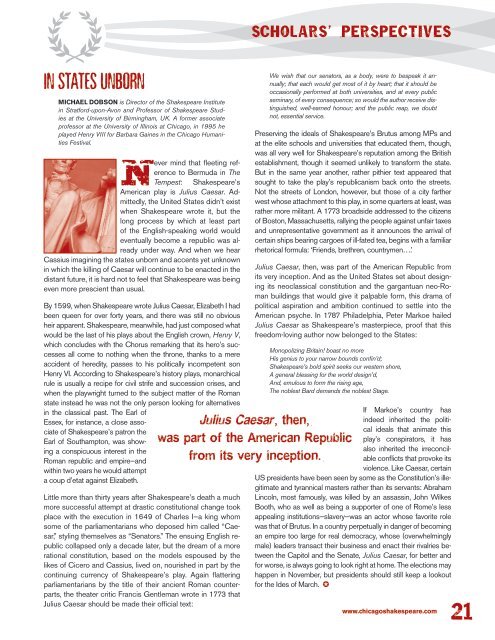Julius Caesar • 2013 - Chicago Shakespeare Theater
Julius Caesar • 2013 - Chicago Shakespeare Theater
Julius Caesar • 2013 - Chicago Shakespeare Theater
Create successful ePaper yourself
Turn your PDF publications into a flip-book with our unique Google optimized e-Paper software.
IN STATES UNBORN<br />
MICHAEL DOBSON is Director of the <strong>Shakespeare</strong> Institute<br />
in Stratford-upon-Avon and Professor of <strong>Shakespeare</strong> Studies<br />
at the University of Birmingham, UK. A former associate<br />
professor at the University of Illinois at <strong>Chicago</strong>, in 1995 he<br />
played Henry VIII for Barbara Gaines in the <strong>Chicago</strong> Humanities<br />
Festival.<br />
never mind that fleeting reference<br />
to Bermuda in The<br />
Tempest: <strong>Shakespeare</strong>’s<br />
American play is <strong>Julius</strong> <strong>Caesar</strong>. Admittedly,<br />
the United States didn’t exist<br />
when <strong>Shakespeare</strong> wrote it, but the<br />
long process by which at least part<br />
of the English-speaking world would<br />
eventually become a republic was already<br />
under way. And when we hear<br />
Cassius imagining the states unborn and accents yet unknown<br />
in which the killing of <strong>Caesar</strong> will continue to be enacted in the<br />
distant future, it is hard not to feel that <strong>Shakespeare</strong> was being<br />
even more prescient than usual.<br />
By 1599, when <strong>Shakespeare</strong> wrote <strong>Julius</strong> <strong>Caesar</strong>, Elizabeth I had<br />
been queen for over forty years, and there was still no obvious<br />
heir apparent. <strong>Shakespeare</strong>, meanwhile, had just composed what<br />
would be the last of his plays about the English crown, Henry V,<br />
which concludes with the Chorus remarking that its hero’s successes<br />
all come to nothing when the throne, thanks to a mere<br />
accident of heredity, passes to his politically incompetent son<br />
Henry VI. According to <strong>Shakespeare</strong>’s history plays, monarchical<br />
rule is usually a recipe for civil strife and succession crises, and<br />
when the playwright turned to the subject matter of the Roman<br />
state instead he was not the only person looking for alternatives<br />
in the classical past. The Earl of<br />
Essex, for instance, a close asso-<br />
ciate of <strong>Shakespeare</strong>’s patron the<br />
Earl of Southampton, was showing<br />
a conspicuous interest in the<br />
Roman republic and empire—and<br />
within two years he would attempt<br />
a coup d’etat against Elizabeth.<br />
Little more than thirty years after <strong>Shakespeare</strong>’s death a much<br />
more successful attempt at drastic constitutional change took<br />
place with the execution in 1649 of Charles I—a king whom<br />
some of the parliamentarians who deposed him called “<strong>Caesar</strong>,”<br />
styling themselves as “Senators.” The ensuing English republic<br />
collapsed only a decade later, but the dream of a more<br />
rational constitution, based on the models espoused by the<br />
likes of Cicero and Cassius, lived on, nourished in part by the<br />
continuing currency of <strong>Shakespeare</strong>’s play. Again flattering<br />
parliamentarians by the title of their ancient Roman counterparts,<br />
the theater critic Francis Gentleman wrote in 1773 that<br />
<strong>Julius</strong> <strong>Caesar</strong> should be made their official text:<br />
SCHOLARS’ PERSPECTIVES<br />
We wish that our senators, as a body, were to bespeak it annually;<br />
that each would get most of it by heart; that it should be<br />
occasionally performed at both universities, and at every public<br />
seminary, of every consequence; so would the author receive distinguished,<br />
well-earned honour; and the public reap, we doubt<br />
not, essential service.<br />
Preserving the ideals of <strong>Shakespeare</strong>’s Brutus among MPs and<br />
at the elite schools and universities that educated them, though,<br />
was all very well for <strong>Shakespeare</strong>’s reputation among the British<br />
establishment, though it seemed unlikely to transform the state.<br />
But in the same year another, rather pithier text appeared that<br />
sought to take the play’s republicanism back onto the streets.<br />
Not the streets of London, however, but those of a city farther<br />
west whose attachment to this play, in some quarters at least, was<br />
rather more militant. A 1773 broadside addressed to the citizens<br />
of Boston, Massachusetts, rallying the people against unfair taxes<br />
and unrepresentative government as it announces the arrival of<br />
certain ships bearing cargoes of ill-fated tea, begins with a familiar<br />
rhetorical formula: ‘Friends, brethren, countrymen….’<br />
<strong>Julius</strong> <strong>Caesar</strong>, then, was part of the American Republic from<br />
its very inception. And as the United States set about designing<br />
its neoclassical constitution and the gargantuan neo-Roman<br />
buildings that would give it palpable form, this drama of<br />
political aspiration and ambition continued to settle into the<br />
American psyche. In 1787 Philadelphia, Peter Markoe hailed<br />
<strong>Julius</strong> <strong>Caesar</strong> as <strong>Shakespeare</strong>’s masterpiece, proof that this<br />
freedom-loving author now belonged to the States:<br />
Monopolizing Britain! boast no more<br />
His genius to your narrow bounds confin’d;<br />
<strong>Shakespeare</strong>’s bold spirit seeks our western shore,<br />
A general blessing for the world design’d,<br />
And, emulous to form the rising age,<br />
The noblest Bard demands the noblest Stage.<br />
, then,<br />
was part of the American Republic<br />
from its very inception.<br />
If Markoe’s country has<br />
indeed inherited the political<br />
ideals that animate this<br />
play’s conspirators, it has<br />
also inherited the irreconcilable<br />
conflicts that provoke its<br />
violence. Like <strong>Caesar</strong>, certain<br />
US presidents have been seen by some as the Constitution’s illegitimate<br />
and tyrannical masters rather than its servants: Abraham<br />
Lincoln, most famously, was killed by an assassin, John Wilkes<br />
Booth, who as well as being a supporter of one of Rome’s less<br />
appealing institutions—slavery—was an actor whose favorite role<br />
was that of Brutus. In a country perpetually in danger of becoming<br />
an empire too large for real democracy, whose (overwhelmingly<br />
male) leaders transact their business and enact their rivalries between<br />
the Capitol and the Senate, <strong>Julius</strong> <strong>Caesar</strong>, for better and<br />
for worse, is always going to look right at home. The elections may<br />
happen in November, but presidents should still keep a lookout<br />
for the Ides of March. ✪<br />
www.chicagoshakespeare.com 21




